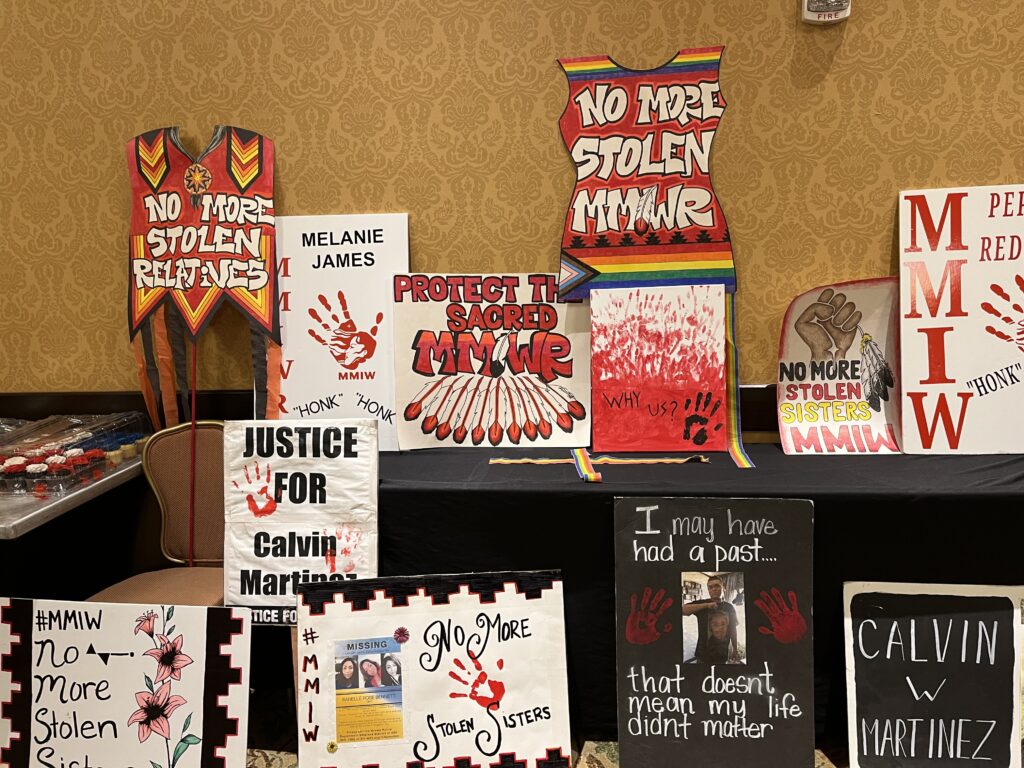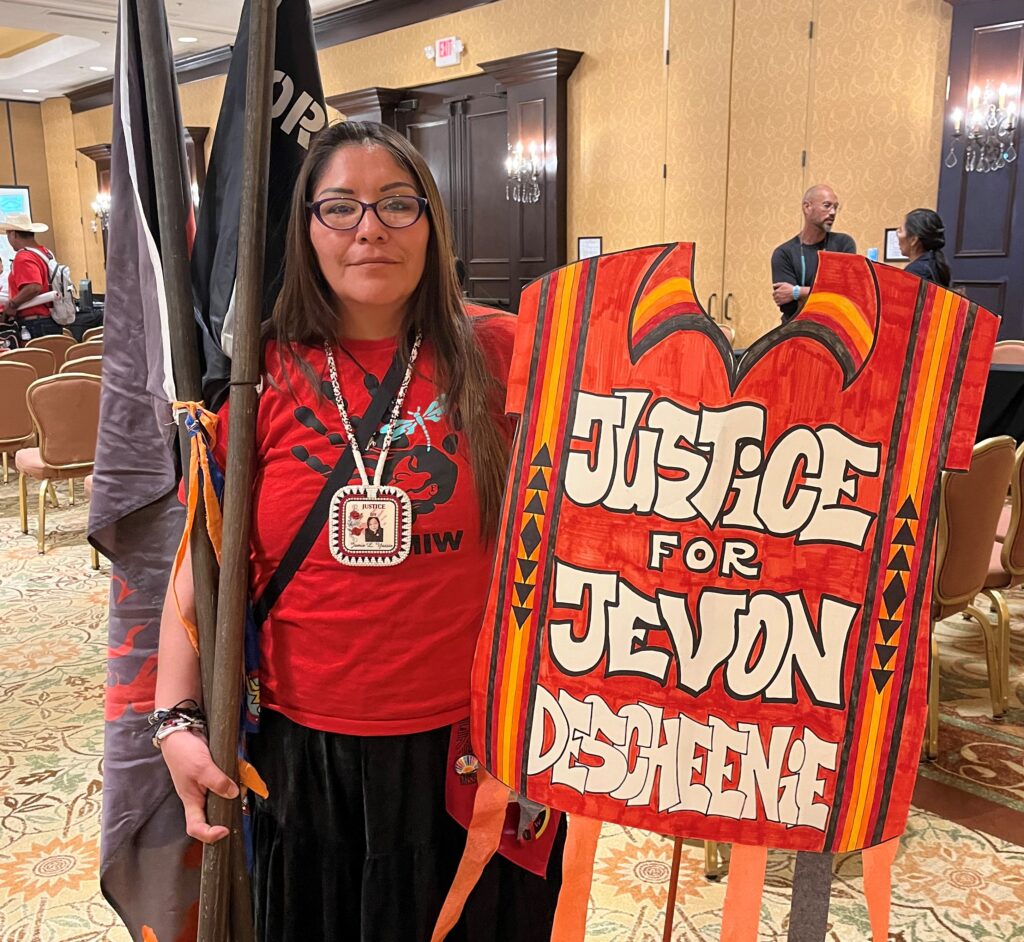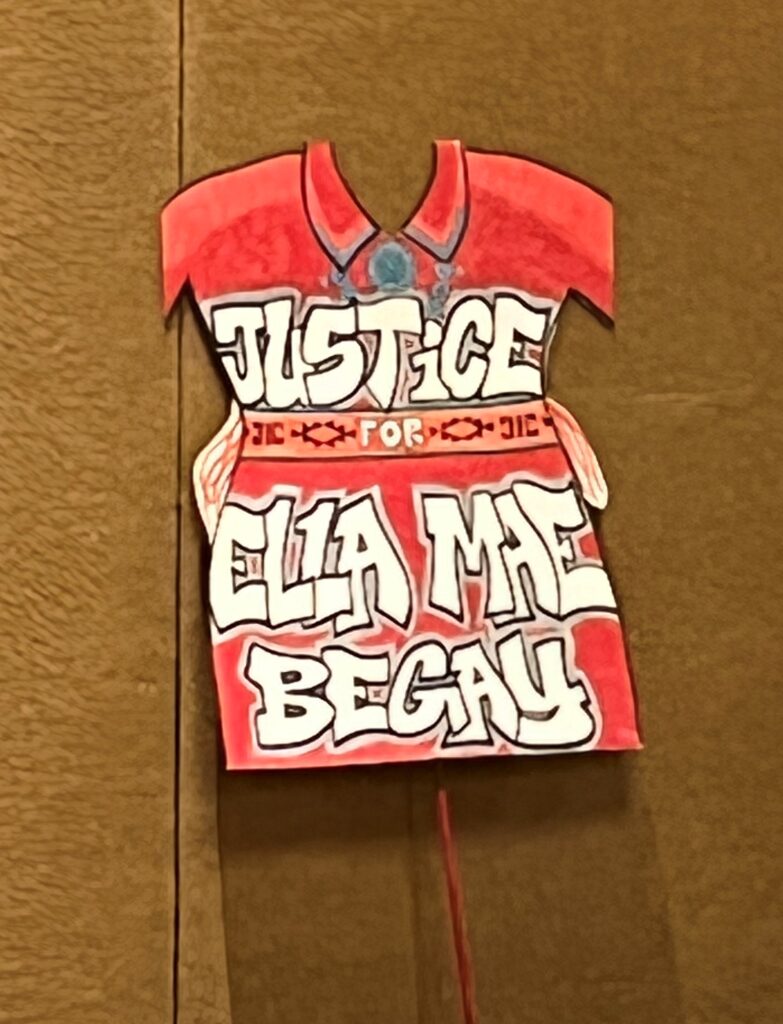I had stopped for gas, and she was walking past on the other side of the street. It was only 10:00 in the morning, but already hot. She wore skimpy shorts and a skimpy top and had what looked like a big beach towel draped around her shoulders. My first thought was that she was on her way to a pool somewhere for a morning swim, but the neighborhood was semi-industrial and urban. Would there be a pool within walking distance, I mused? And her gait was a little off for a young woman on her way for morning exercise. Each step was slightly tentative. Maybe it was the flip flops she was wearing, I thought. Or she could be a little hung over, and I imagined a night of partying. Her expression was serious, preoccupied as if she were imagining herself somewhere else. The gas nozzle clicked off and I turned my attention to finishing the transaction and getting back on the road.
I was on my way to facilitate one of seven public hearings for the Not Invisible Act Commission, this one in Albuquerque, just down the road from Santa Fe. For three days the commissioners and staff heard from those who wanted to share their stories, highlight injustices and gaps in services, plead their cases, and make suggestions for how the system could work better to address the epidemic of murdered, missing and human trafficked Indigenous people (MMHTIP). There were boxes of Kleenex on every table. The walls were lined with home made placards and posters. Family members and survivors wore red to symbolize the blood shed in this slaughter. The testimony was unbelievably powerful, heart- and gut-wrenching, and often shocking. These witnesses were courageous. They told very personal and painful stories in order to bring attention to the wrongs happening every day in Indian country. Most of the stories reflect the hopelessness and helplessness victims and family members experience when a loved one is lost or murdered.
I want to offer a sample below so that you have a feeling for the nature of the problem and the impact that it has on a variety of people. It’s heavy, yes, but it’s also inspiring to see people empower themselves to educate others and demand justice, at great cost to themselves. I consider all who testified heroes. [All names are changed of course]
Harold, an older Tribal Policeman, told of getting a call in the middle of the night to go to a remote part of the reservation to investigate a shooting. He asked for back up, but there was none. Tribal law enforcement departments are chronically understaffed for several reasons. The work is hard, especially in your own community. The pay is low and there are no pensions, so officers often choose to work with state or federal agencies that offer retirement and benefits. But Harold was committed to his community and wanted to serve despite the hardships. So he drove 2 hours to the site and found a trailer smoldering at one end. Fearing an explosion he rushed in and found 3 small children, all with gunshot wounds. The father who had shot them was long gone. Two of the children were dead. Harold thought the third, a little girl, might still be alive and carried her outside. He called the station and asked for medical help asap. He tried to revive her, but she died before they arrived. “It was the worst night of my life, and I carry it with me every day,” he said through his tears. It was in 1996, long ago in time, but yesterday in Harold’s heart.
Charlene was born into a dysfunctional family, where domestic violence and drug abuse were the norm. She left home as a teenager to find work and a better life for herself. Her choice in partners was not good, and before she knew it her boyfriend became her trafficker. His first step was to addict her to drugs. With her completely dependent on him for the supply, he could prostitute her and keep the money, as long as he kept her addicted. She recalled feeling deep shame which kept her from seeking help or contacting her family, who were frantic. When she finally tried to break free, the woman who appeared to help her turned out to be part of the ring, and returned her to her abuser and pimp. After three years, Charlene finally escaped and found help with a local church. For now the cycle is broken, but the predators are out there, and she is vulnerable. Everyone in the room was rooting for Charlene, but until significant changes are made in law enforcement and social services, the cards are stacked against her.
This one really shocked me, for it is pure evil. In Arizona criminals masquerading as health providers have raked in hundreds of millions of dollars in fake Medicaid claims for treatment and rehabilitation never provided to addicted and mentally ill Indigenous people. Needing bodies for billing purposes, they have aggressively recruited (kidnapped) and victimized vulnerable Natives, focusing on the Navajo Nation. The scammers scout potential victims at flea markets, shopping centers, clinics, and even outside legitimate treatment centers. They prey on the elderly and those with alcohol or drug problems, offering to take them to a facility for help, and sweetening the deal with whatever poison they prefer. Often unaware of where they are or what is happening, they are taken to short-term rental homes in the Phoenix area, where they are imprisoned and often drugged. They receive none of the help promised and are simply kept as a cash cow for the crooks. Meanwhile, back home family members are desperate to find their missing relative. “Grandma was going to buy flour at the store, and she never came home.” “My brother – he’s alcoholic — went to town and disappeared into thin air.” Recently the FBI has cracked down on many of the fake treatment facilities, closing them and releasing hundreds of often confused and abused Natives with no identification who may not know where they are, or even where they are supposed to be. A wonderful organization Operation Rainbow Bridge has stepped up to help reunite these victims with their communities and hopefully get them the treatment they need — now more than ever.
The Commission heard these messages and others loud and clear.
- More resources (that’s gov-speak for money) are needed to provide culturally appropriate health and social services for Native communities and families so they can care for their vulnerable members, and reduce the numbers of missing, murdered and trafficked.
- To keep Tribal police departments fully staffed with high quality officers, money, training and mental health support are needed across the country.
- Media attention needs to focus on the MMHTIP cases. It’s painfully clear that alerts are sent out about a missing non-Native girl within hours of the incident. The vast majority of Native cases we will never hear about.
- There is a desperate need for coordination and information sharing at the Tribal, local, state and federal levels. This could lead to faster response to a missing person report, apprehension of the perpetrator, identification of the deceased, and a data base that would enable us to monitor the epidemic and spot the most needy areas and most successful responses.
I left the three days of hearings with a heavy heart and with appreciation for the resilience of Native people and this movement that they have started. On my way back home, I thought about Charlene’s story… and about the girl wrapped in the beach towel that I had seen on my way to Albuquerque. I realized that she may not have been headed for a dip in the pool. She may have been fleeing something or someone. She may not have been hungover from a party with friends, but in the clutches of addiction. That may not have been a swimming outfit, but some kind of undergarments. That may not have been a beach towel but a cheap motel blanket. That look on her face… that may have been exhaustion, confusion, fear. I hope she is all right, and I’m sorry I was naïve. I’m wiser now, thanks to those courageous witnesses.




What a daunting prospect you face: balancing hope that critical changes can be made against despair and distress.
Lucy, your courage, persistence, strong heart, and fortitude are an inspiration.
Thank you so much, Keith. I really appreciate the warm words.
Thank you so much, Lucy, for your heartfelt and deeply disturbing report. It’s not like I was blissfully ignorant of the situation but often, when I would read about a particular incident, I would just say a small prayer and move on to the next things on my list. I will make an effort henceforth to do more, if only something small.
Dang, If I had known you were just down the road in ABQ, facilitating this public hearing for the Not Invisible Act Commission, I would certainly have invited you to tea!
Thanks, Laurie…. maybe next time.
Very moving Lucy. Missing indigenous folks, especially women, is an ongoing tragedy here in AZ. More can certainly be done to publicize missing persons and help return them. We get occasional “Amber Alerts” but I don’t ever recall an indigenous name attached to an Alert. Good work Lucy – this contributes to publicizing the problem.
Dale, so good to hear from you. Interesting about the Amber Alerts, isn’t it? I can say the same in New Mexico. Hopefully this attention will change things.
Hi Lucy, I’m so glad you highlighted this deeply tragic situation. It is so hard to think of the injustice, loss and grief that is a part of Native people’s lives. There is such a heaviness there just to listen let alone to live in. I was going to say “to live through” but does the ache ever end in their hearts?
How does a woman move from Massachusetts to Northern Arizona and become a champion for the Navajo Nation and others. I am so glad I read your book INTO THE CANYON as it has given me a bigger heart and wider eyes. I’m also grateful for the thumbs up on Operation Rainbow Bridge in Phoenix. I looked up their website and will be making a donation.
May you have a road of soundness and strength as you carry on in your precious work.
What a lovely message, Karen. Thanks so much, and a contribution to Operation Rainbow Bridge is a wonderful outcome for the post. Makes me glad I wrote it!
I too thank you for this report and of course for your contribution to the remarkable work of the Commission. First words are stunned, speechless, thought I had some idea but have had head deep in sand. I will follow Karen’s example. What grueling experiences, how awful, what resilience. I will sending this blog to a number of friends.
Thank you, Ann, for spreading the word, ugly as it is. It’s so easy — and tempting — to have our heads in the sand. If it weren’t for this work I would have no idea.
My gratitude to you for staying the course through horrific seas, to support those witnesses in fully representing their stories, I hope they were heard, and that the powers that be can find not only compassion for these families and friends, but also will wisely invest in legitimate investigations and solutions for this tragic story.
the girl with the beach towel: I am inspired to be more conscious.
Thanks for your talents and commitment!
Marcia, I miss you, and your wise, compassionate outlook on the world. Thanks so much for weighing in, and for the work that you do and have done with federal agencies to build relationships, promote respectful interactions. You’ve done good!
Wow, thanks Lucy for sharing these powerful and hard to imagine tragedies of human experience… the more we can all learn, the more we can hopefully act. Look forward to seeing you soon.
Thanks, Seth, and it was great to see you and Kendra here last week. A real treat! Take care
You continue to amaze me my sweet and caring friend. What a journey you are on. My heart breaks for these people I love and respect – I think of my time on the Navajo Nation and of the kindness shared with me; we must do the same for them and stop these horrific tragedies.
Susan, you are so right. I’m glad that you and I share profound experiences at Navajo. It makes this all the more painful and the need to help all the more urgent. thank you, dear friend.
Your posts are always thought-provoking; this one is heart-wrenching, but because of you and your work, a tiny bit hopeful.
In British Columbia it is so arresting to drive down a road and see leafy trees draped with 3 or 4, or 7 or 8 or 9 red dresses fluttering silently in the breeze. Thank you for your efforts.
Thank you, Tyson. Wow, what an image of those red dresses fluttering silently among the leaves… All the hearing rooms have been draped with those dresses — and t-shirts for men and boys, too. Such a poignant, painful message.
What’s left to be said? I’m sure you are aware of the movie Sound of Freedom which echos much of what you experienced. There is also the Joy International organization that works to help recover children from slavery. Thank you for sharing your experience. Having worked in 15-20 developing countries, i have seen many situations where children are in need of rescue. There unfortunately is more slavery today than existed during the civil war.
Grim reality, Larry. Thanks for commenting and for the work you have done over the decades.